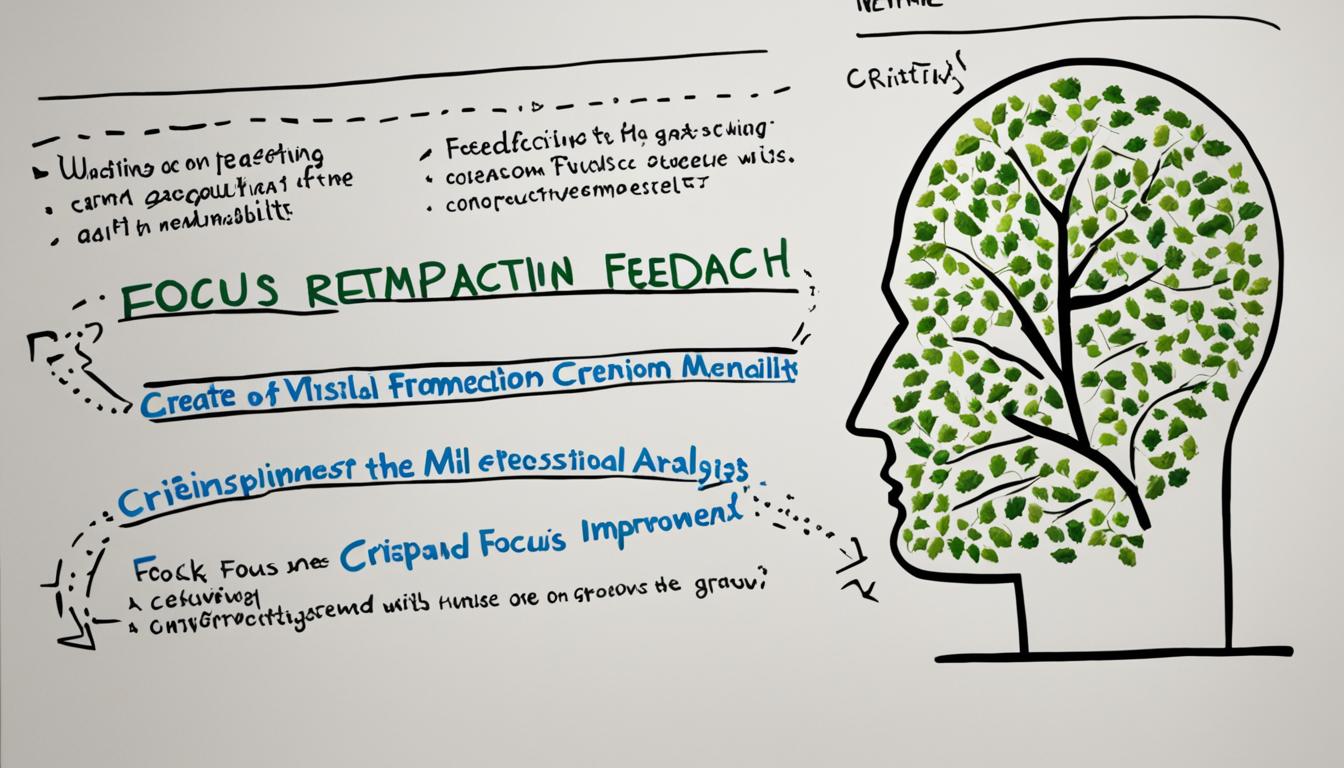In today’s fast-paced corporate world, we face the challenge of maintaining focus and concentration amidst numerous distractions. Technology, noise, and stress can hinder our productivity, making it essential to develop effective strategies to improve our focus and concentration.
To enhance our attention span and boost our ability to concentrate, it is crucial to prioritize tasks and set clear goals. By establishing a clear vision and breaking down complex assignments into manageable chunks, we can minimize distractions and maintain focus on our work. Additionally, creating a distraction-free environment, practicing mindfulness, and prioritizing self-care contribute significantly to our ability to improve concentration.
Throughout this article, we will explore various techniques and practices that can help us optimize our focus and concentration, leading to increased productivity and success in our personal and professional lives.
Key Takeaways:
- Setting clear goals and prioritizing tasks helps minimize distractions and maintain focus.
- Breaking down complex tasks into manageable chunks enhances focus and reduces overwhelm.
- Creating a distraction-free environment, such as a designated workspace, can significantly improve concentration.
- Practicing mindfulness and engaging in deep breathing exercises can reduce stress and increase mental clarity.
- Prioritizing sleep and nutrition supports focus and concentration, leading to improved productivity.
Prioritize and Set Clear Goals
Establishing a clear vision and setting realistic goals can have a significant impact on our focus and concentration. When we prioritize tasks and allocate specific time for each activity, we minimize distractions and maintain our focus on assignments. By organizing our workday effectively, we create a structured and productive environment that enhances our ability to stay on track and achieve our objectives.
“The greater danger for most of us lies not in setting our aim too high and falling short, but in setting our aim too low and achieving our mark.” – Michelangelo
When we prioritize tasks, we identify the most important and urgent activities, allowing us to focus our attention and energy on what truly matters. By setting clear goals, we gain clarity on our objectives and the steps needed to accomplish them.
Here is an example of how we can prioritize tasks:
| Task | Priority |
|---|---|
| Complete project proposal | High |
| Respond to urgent emails | Medium |
| Prepare presentation for client meeting | High |
| Review colleagues’ work | Low |
By organizing our tasks in order of priority, we ensure that our time and energy are directed towards what is most important. This approach helps us overcome distractions, maintain focus, and make consistent progress towards our goals.
By establishing a clear vision, setting realistic goals, and prioritizing tasks, we create an organized workday that maximizes our focus and concentration. The next section will explore how breaking tasks into manageable chunks can further enhance our productivity.
Break Tasks into Manageable Chunks
When faced with complex tasks, it can be overwhelming and challenging to maintain focus and productivity. However, by breaking down these tasks into smaller, more manageable chunks, you can increase your ability to concentrate and reduce feelings of overwhelm. One effective technique that can help with this is the Pomodoro Technique.
The Pomodoro Technique involves working in short intervals, typically 25 minutes, followed by a brief break. This approach allows you to maintain a concentrated focus during work intervals and provides valuable mental rest during the breaks. By alternating between periods of intense focus and relaxation, you can optimize your productivity and achieve higher levels of output.
“Breaking down complex tasks into smaller parts increases focus and reduces overwhelm.”
The Pomodoro Technique can be implemented using a timer or specialized apps, providing a structured framework for your workday. During each work interval, it’s essential to eliminate distractions and solely dedicate your attention to the task at hand. As you progress through the intervals, you’ll find that your focus improves, allowing you to complete each task more efficiently.
Incorporating mental resting periods into your work schedule is equally crucial. Taking short breaks after each work interval allows your brain to recharge, reducing fatigue and preventing burnout. During these breaks, engage in activities that help you relax and recharge, such as stretching, deep breathing, or simply taking a short walk.
Incorporating the Pomodoro Technique into Your Workflow
To begin implementing the Pomodoro Technique, follow these steps:
- Choose a task from your to-do list that requires focus and concentration.
- Set a timer for 25 minutes and start working on the task.
- Focus solely on the task, minimizing distractions.
- Once the timer goes off, take a 5-minute break.
- Repeat this cycle four times, and then take a more extended break of 15-30 minutes.
This iterative approach allows you to maintain a productive workflow and prevents burnout by incorporating regular mental rest periods. By breaking tasks into manageable chunks and incorporating the Pomodoro Technique into your work routine, you can significantly enhance your focus, concentration, and overall productivity.
| Benefits | Description |
|---|---|
| Increased focus | The structured intervals promote sustained focus and minimize distractions. |
| Enhanced productivity | By breaking tasks into smaller parts, you can accomplish more in less time. |
| Reduced stress | The regular breaks prevent burnout and provide opportunities for relaxation. |
| Improved time management | The defined work intervals help you prioritize tasks and manage your time effectively. |
Create a Distraction-Free Environment
Distractions can significantly hinder our ability to focus and concentrate on tasks at hand. To enhance our productivity, it is crucial to reduce distractions, minimize background noise, and create a designated workspace that promotes concentration.
Limit Interruptions
Constant interruptions can disrupt our flow and divert our attention away from important tasks. To reduce distractions, we can:
- Turn off notifications on our devices
- Set specific times to check emails and messages
- Inform colleagues and family members about our focused work periods
Wear Noise-Canceling Headphones
Background noise can be a major distraction, especially in busy or open office environments. Wearing noise-canceling headphones can help block out external sounds and create a more peaceful and focused work environment.

Create a Designated Workspace
A cluttered and disorganized workspace can increase distractions and make it difficult to concentrate. By creating a designated workspace, we can:
- Organize our desk and remove unnecessary items
- Ensure proper lighting to reduce eye strain
- Personalize the space with elements that inspire productivity
“The ability to concentrate and to use your time well is everything if you want to succeed in business–or almost anywhere else for that matter.” – Lee Iacocca
| Distraction | Effect on Focus |
|---|---|
| Noise | Diverts attention and hampers concentration |
| Notifications | Interrupts workflow and shifts focus |
| Disorganized Workspace | Increases visual distractions and decreases efficiency |
Creating a distraction-free environment is an important step in improving our ability to focus and concentrate. By reducing distractions, minimizing background noise, and establishing a designated workspace, we can optimize our productivity and achieve better results.
Practice Mindfulness and Meditation
Incorporating mindfulness practices and meditation into our workday can have a profound impact on our focus and concentration. Engaging in deep breathing exercises and short meditation sessions trains our minds to stay present and focused, reducing stress and enhancing mental clarity.
Mindfulness practices involve bringing our attention to the present moment, fully aware of our thoughts, feelings, and sensations. By cultivating mindfulness, we can become more attuned to our surroundings and better equipped to deal with distractions. This heightened awareness allows us to redirect our focus back to the task at hand, improving our productivity and efficiency.
Deep breathing exercises are an excellent tool for reducing stress and increasing clarity. Taking slow, deliberate breaths activates our body’s relaxation response, calming the mind and reducing tension. By pausing for a few moments to focus on our breath, we can clear our minds of clutter and regain mental clarity.
“The thing about meditation is that you become more and more you.”
– David Lynch
In addition to deep breathing, incorporating short meditation sessions can further enhance our focus and concentration. Just a few minutes of meditation each day can significantly improve our ability to maintain attention and stay present. Research has shown that regular meditation practice can lead to structural changes in the brain, promoting increased focus, cognitive flexibility, and emotional regulation.
Mindfulness Exercise: Body Scan
One effective mindfulness exercise is the body scan. Find a comfortable position, either sitting or lying down, and close your eyes. Start by focusing your attention on your breath, noticing the sensation of each inhale and exhale.
Next, slowly move your attention down through your body, starting from the top of your head, all the way to your toes. As you move your attention through each body part, notice any sensations, tension, or areas of discomfort. Without judgment, simply observe these sensations and allow them to be present.
By practicing the body scan regularly, we become more attuned to our physical sensations, which can help anchor us in the present moment and improve our focus.
| Mindfulness Practices | Deep Breathing Exercises |
|---|---|
|
|
Prioritize Sleep and Nutrition
Adequate sleep and proper nutrition are crucial for maintaining a well-rested body and a clear-thinking mind. Prioritizing self-care, getting enough sleep, and maintaining a balanced diet contribute to improved focus, concentration, and productivity.
When we prioritize our sleep, we allow our bodies and brains the necessary time to rest and rejuvenate. Sleep deprivation can lead to decreased cognitive function, impaired decision-making, and difficulty in maintaining concentration. To ensure we are well-rested, experts recommend getting 7-9 hours of sleep each night. By making sleep a priority, we can wake up refreshed and ready to tackle the day with a clear mind.
In addition to sleep, proper nutrition plays a significant role in supporting our cognitive abilities. A balanced diet provides the essential nutrients, vitamins, and minerals our brain needs to function optimally. Consuming a variety of fruits, vegetables, whole grains, lean proteins, and healthy fats nourishes our brain and promotes mental clarity.
Here is a breakdown of some key nutrients that contribute to clear thinking and productivity:
| Nutrient | Food Sources |
|---|---|
| Omega-3 fatty acids | Fatty fish (salmon, mackerel, sardines), walnuts, flaxseeds |
| B Vitamins | Whole grains, leafy greens, legumes, eggs, poultry |
| Antioxidants | Blueberries, spinach, kale, dark chocolate |
| Protein | Lean meats, poultry, fish, dairy products, tofu |
| Hydration | Water, herbal tea, fruits with high water content |
By incorporating these foods into our diet, we provide our bodies and brains with the necessary fuel to thrive. Remember to stay hydrated throughout the day as dehydration can lead to fatigue and decreased cognitive function.
It’s important to note that maintaining a healthy sleep schedule and balanced diet is not just beneficial for our work performance, but also for our overall well-being. Taking care of ourselves by prioritizing sleep and nutrition allows us to show up as the best version of ourselves in both our personal and professional lives.

Let’s prioritize our sleep and nutrition for a well-rested body, a clear-thinking mind, and enhanced productivity.
Improving Focus and Concentration in the Workplace
Improving focus and concentration in the workplace is vital for maximizing productivity and performance. To create a successful work environment and enhance focus, we can implement various strategies:
1. Task Prioritization
Prioritizing tasks is a key element in achieving an efficient workday. By identifying the most important assignments and allocating time accordingly, employees can focus on what matters most and avoid getting overwhelmed.
2. Creating a Distraction-Free Space
A distraction-free environment significantly enhances focus and concentration. Designating a specific workspace free from interruptions and background noise allows employees to work with minimal distractions, resulting in improved productivity.
3. Practicing Mindfulness
Mindfulness practices, such as deep breathing exercises, can help reduce stress and increase clarity. By incorporating short mindfulness sessions throughout the workday, employees can improve their ability to stay present and focused on the task at hand.
4. Prioritizing Self-Care
Self-care plays a crucial role in enhancing focus and concentration. Adequate sleep and a balanced diet contribute to a well-rested body and clear thinking. Employees should prioritize their well-being to ensure optimal productivity.
“Efficiency is doing things right; effectiveness is doing the right things.” – Peter Drucker
By implementing these strategies, we can create a more efficient work environment that fosters focus and concentration. Prioritizing tasks, creating a distraction-free space, practicing mindfulness, and prioritizing self-care are key steps towards enhancing focus and productivity in the workplace.
Conclusion
Enhancing focus and concentration is vital for achieving success in today’s fast-paced world. By implementing various strategies, we can maximize our productivity and reach our goals.
Firstly, setting clear goals and prioritizing tasks helps us stay organized and minimize distractions. Breaking tasks into manageable chunks using techniques like the Pomodoro Technique allows for focused work and mental rest, leading to increased productivity.
In addition, creating a distraction-free environment is essential. By reducing interruptions, background noise, and setting up a designated workspace, we can enhance our focus and concentration.
Mindfulness and meditation practices, such as deep breathing exercises and short meditation sessions, prove effective in reducing stress and increasing mental clarity, enabling us to maintain concentration on our tasks.
Lastly, prioritizing sleep and nutrition plays a crucial role in optimizing focus and concentration. Getting enough rest and maintaining a balanced diet contribute to a well-functioning brain, resulting in clear thinking and improved productivity.
To conclude, by incorporating these strategies into our daily lives, we can enhance our focus and concentration, ultimately leading to greater success in both personal and professional endeavors.
FAQ
What are some techniques to improve concentration?
To improve concentration, you can prioritize tasks, set clear goals, break tasks into manageable chunks, create a distraction-free environment, practice mindfulness and meditation, and prioritize sleep and nutrition.
How can setting clear goals improve focus and concentration?
Establishing a clear vision and setting realistic goals can have a significant impact on focus and concentration. When you have a clear direction and know what you want to achieve, it becomes easier to stay focused and avoid distractions.
What is the Pomodoro Technique, and how does it help improve concentration?
The Pomodoro Technique involves working for short intervals, typically 25 minutes, followed by a short break. This technique allows for concentrated focus during work intervals and gives the mind a chance to rest, leading to increased productivity.
How can I create a distraction-free environment?
To create a distraction-free environment, you can limit interruptions, turn off notifications, wear noise-canceling headphones, and establish a designated workspace. These actions help reduce distractions and allow for better focus and concentration.
How does practicing mindfulness and meditation enhance focus and concentration?
Incorporating mindfulness and meditation into your workday helps improve focus and concentration. Engaging in deep breathing exercises and short meditation sessions trains the mind to stay present and focused, reducing stress and enhancing mental clarity.
Why is prioritizing sleep and nutrition important for focus and concentration?
Adequate sleep and proper nutrition support focus and concentration. Prioritizing self-care, getting enough sleep, and maintaining a balanced diet contribute to a well-functioning brain, leading to improved focus, productivity, and overall well-being.
How can I improve focus and concentration in the workplace?
To improve focus and concentration in the workplace, you can prioritize tasks, create a distraction-free environment, practice mindfulness and meditation, and prioritize sleep and nutrition. These strategies will help you create a more efficient work environment and enhance your focus and productivity.
How can I enhance my focus and concentration to achieve success?
To enhance focus and concentration and achieve success, you can implement strategies such as goal setting, breaking tasks into manageable chunks, creating a distraction-free environment, practicing mindfulness and meditation, and prioritizing sleep and nutrition. These techniques will help you maximize your productivity and reach your goals.



